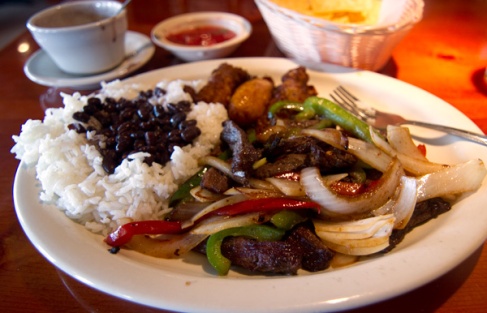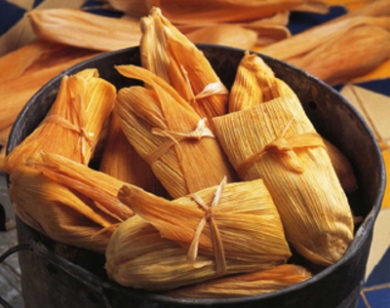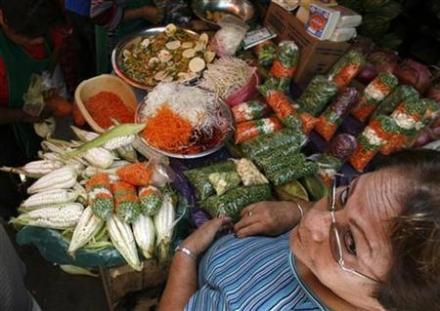FOOD! That first tortilla that comes off the comal, steamy and pliant with the aromatic smell of corn bursting in the air as a piece is torn away in order to scope up the contents on the plate. In the Latino literature that has been read in class we discover that there emotional and physical ties to the food that has nurtured our bodies from infancy. When boarding a plane to go home, I am usually excited to see my family but the second thing that I am most excited for is my mother’s cooking; beef tongue tacos, mole, posole, and the menudo that revives anyone from a night of heavy drinking. Food is as memory invoking as a photograph when it comes to family and home. Santiago, in Latin Moon over Manhattan, had a similar feeling of coming home when he gazes upon the feast his mother has prepared for him. It is symbolic that his friend dies after eating a Colombian dish and feels a sense of completion when he does. Anzaldua writes poetry about the symbolic food staple that is the cactus and it’s nature in forming her identity.
Latino food is delicious and diverse in it’s offering, it is also gaining popularity in the US. In a recent Gourmet Magazine, an entire issue was dedicated to Latino Food yet the editor in chief,Ruth Reichl, received some love but also some hate on dedicating a whole issue to Latino cuisine. The Reuters article read “Americans may be split over what to do about immigration but when it comes to food they are curious and more willing to experiment, specially with Latin American cuisine, according to a food expert.” ( I also love that they brushed aside the pesky immigration thing…not)
Yes, America is enamored with Latino food yet roughly have of it’s population is against immigration reform with little tolerance to the people that harvest the food that they are consuming.That’s why it irks me when people say “OMG, I love LOVE Mexican food” yes thanks for loving the food but not the people making the food.

Reichl said that people had a negative reaction to the article, often saying why there was a need to dedicate a whole issue to Latino food when the title of the magazine was French, and the editor in chief said that was straight up racism that drove most of the comments. WHY?! It’s about delicious food! Who got offended enough to write a letter about a cuisine that is as integral in the American palate as hamburgers.
I won’t get into the typical American procedure of taking something as pure as a taco, then Frankenstein into this Taco Bell chain, Baja Fresh of the numerous Chipotle we see scattered along the road. Taking something so rich in emotional connection and repackakaging into a weaker and more appealing to the American palate is something that happens to all the cultures that get integrated into the Amrican life.
Food is home, my siblings, the way that I reconnect to an absent family in Oregon and the way that I bond with my roommates it makes me laugh that people raise fuss about it but also calls to attention how important food is when it comes to creating my Latinidad, why it’s a strong focus in Latin@s culture and why even after all this time, the smell of that tortilla is what brings you home.



Ms. Bustos, you eloquently discuss the connection between food and some of the novels we have read in Latin@ countercultures. I agree with your declaration that “food is as memory invoking as a photograph when it comes to family and home.” Whenever I get a chance to come home the first thing I think of is seeing my family, the second is my mother’s cooking. There are dished that are made on special occasions and growing up you could almost tell the time of year by what was for dinner. There were always tamales during New Year’s, ponche for Christmas and panbazos and fried fish during the Fridays of lent. My dad made his signature carne asada on Sundays if the weather was nice and my mother made my father mole when it was his birthday. There is strong connection between food and the occasion; I still contend that no one eats as well as a latin@ family on Easter Sunday. There is less than a week until I’m up to my elbows in tacos, salsa and dos equis.
However, while food is often a reason to gather, what is eaten can also be quite political. In my latin@ experience, I did not grow up eating nopales. Not once, not ever. When I got asked by my classmates in school if I had eaten nopales (because we were reading some Mexican American literature) and I said that I had never eaten nopales, my Mexican American classmates were flabbergasted. My parents had often told me that nopales were not a “high class food” and now that they were in the U.S. they would be damned if they had to eat nopales. I know this is shocking and could been seen as fighting words to some latin@ families but it’s the political reality of my childhood. Being conscious of the politics of certain dishes I can see why so many people were up in arms about an issue of Gourmet Magazine that featured “Latino Food.” There is double standard when it comes to European and Latin American food. One is thought of to be of “higher quality” and class than the other. It seemed shocking to the readers of Gourmet Magazine that “Latino Food” should be included. I mean, what’s gourmet about tongue tacos and cactus? It’s different if you’re eating snails. I mean there’s just something more exotic about it, right?— Something so European—As if everything that has ever come from that littler corner of the world has always been good.
This devaluation of Latin American food is seen very clearly in American culture. Ms. Bustos names many of the culprits in her blog post. Chipolte, Baja Fresh, the infamous Taco Bell and Del Taco. Seriously, who came up with the name Del Taco? “Of the taco?” that makes no sense. Good working marketing team! Was there even a Spanish speaker in the room when you made this decision? For some reason it’s ok to appropriate and basically destroy Latin American food but once we come to something French or Spanish or some other kind of European country, it’s on a whole other level. This double standard is problematic and clearly shows what is valued by American culture and what still holds a second class status. I agree with Ms. Bustos that food holds an emotional connection in some latin@ families and that seeing it devalued to fast food fodder just makes me shake my head. I’m heading to the airport tomorrow and even though there’s plenty of “Mexican places” I think I’ll just get a sandwich and wait for my mother’s tacos.
I like your response, it prompts myself and other readers to view how problematic it is to talk about food of a culture. This blog post has the bias of an anger that Latinos provide a large part of the workforce for the food service industry in America with terrible pay and are still being rounded up at their workplace by the same individuals who had eaten there the previous week, We are not historically unique in this exploitation but sometimes I laugh at the thought of someone petitioning against immigration reform and then going to McDonald’s where their food is prepared by an undocumented immigrant, whose cheap labor helps maintain the low prices of the American food they so lovingly ingest.